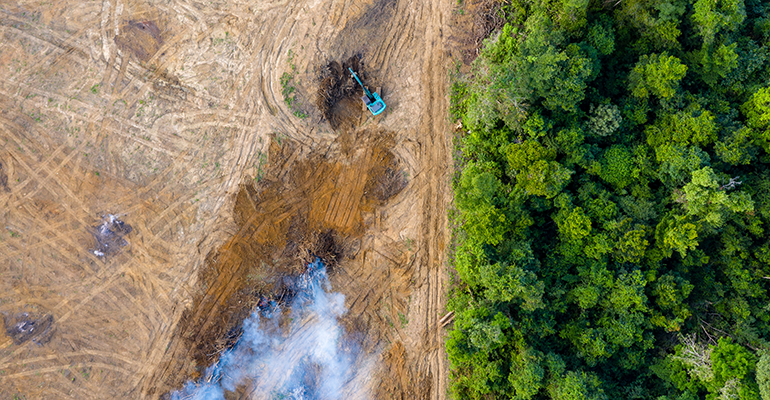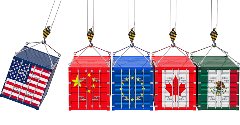News
EUDR delay: Palm-oil producing countries react
29 Oct 2024With the European Council backing a 12-month extension of the EUDR, leading palm oil-producing countries Malaysia and Indonesia are pushing for recommendations and practical guidance.

The European Council confirmed a 12-month delay to the implementation of the European Union Deforestation Regulation (EUDR), which (if confirmed) would enter into force on December 2025 for large companies and 2026 for small-to-medium businesses (SMEs).
A statement issued on 16 October said that the Council would inform the European Parliament of its position in view of the Parliament taking a decision on its position. The Council is aiming to have the regulation formally adopted by both co-legislators and published in the Official Journal of the EU so that it can enter into force by the end of the year.
Palm oil impact
Palm oil is one of the commodities closely linked to deforestation, along with cocoa and coffee, nonprofit policy research organisation, The Center for Strategic and International Studies (CSIS), stated. The vegetable oil is found in 50% of packaged products consumers shop for in supermarkets. According to the international non-governmental organisation WWF, while 42 other countries produce palm oil, Indonesia and Malaysia are responsible for 85% of the globe’s palm oil production.
Delegations of the EU, Malayia and Indonesia have been meeting to discuss how the two markets will work together to plan, prepare and proceed amid the EUDR’s 2025 introduction date.
The 3rd meeting of the Ad Hoc Joint Task Force (JTF), facilitated by the Council of Palm Oil Producing Countries (CPOPC), representing Indonesia and Malaysia, saw over 80 stakeholders gather. The Indonesian and Malaysian governments, the European Commission, the private sector, Civil Society Organisations (CSOs), smallholders and academia were all in attendance.
In the latest JTF meeting, the EU, Indonesia and Malaysia said they would collaborate to create recommendations and a practical guide to be published by November 2024. These will be provided by the respective national traceability tool for smallholders and SMEs in the palm oil, cocoa and coffee sectors. They aim to help operators in these industries prepare for the EUDR.
In addition, the EU and Malaysia confirmed they will organise cross-commodity and private-sector dialogues in Indonesia and Malaysia to understand their needs before they have to enter the EUDR’s application process.
EUDR implementation concerns remain
At the latest meeting between the three markets, Indonesia and Malaysia reiterated their worries that the EU market will become an uncertain market to operate and trade in if it lacks clear implementation guidelines provided in a timely manner. Indonesia and Malaysia urged the EU to offer practical regulatory information before the application process.
Ensuring adequate information technology systems are in place to collect data has been a key issue, which the EU shared at the JTF meeting. It spoke of concerns about potential legal restrictions in both Southeast Asian countries to collect geolocation, which remains a must for operators under the new law.
For now, resolution on this issue remains unclear, as the press release stated that Indonesia and Malaysia highlighted that the privacy and security laws of Indonesia and Malaysia protect the data required by the EUDR.
China has also expressed concerns regarding the IT side of the EUDR about data sharing, as reported by the German timber trade association, GD Holz, in July. As reported, China, which has one of the globe’s largest forest markets, opposed sharing geolocational data with the EU on the grounds of “security concerns”.
The EU has reportedly confirmed that imports without coordinates are not possible and that no exceptions will exist.
How does the EUDR affect non-EU countries?
The EUDR also applies to non-EU companies, therefore having far-reaching global effects. The European Commission says that any company placing a relevant commodity or product on the market or exports it is considered an operator under the EUDR.
Additionally, under the regulation, any company that makes a product available on the market for the purposes of commercial activity, but who is not an operator is considered a trader, and will also need to adhere to the relevant requirements.
Large-scale producers of non-EU-based commodities and food products are therefore seeking updates and guidance from the Commission on how to prepare for the EUDR’s arrival.
Traceability tools
The EU recognised actions to enhance traceability and transparency across supply chains in sustainable commodities with the Indonesian National Dashboard Initiative and Malaysia’s traceability tools such as Sawit Intelligent Management System (SIMS), GeoPalm Portal and MSPO Trace. It stated that national certification schemes like Malaysian Sustainable Palm Oil (MSPO) and Indonesian Sustainable Palm Oil (ISPO) provide a supporting tool for operators and traders.
Indonesia has developed its SatuData platform to enhance traceability, depicting various land use and land change maps that link to a new palm oil traceability web. The platform aims to provide data and methodologies to track land use and change throughout the supply chain, strengthening due diligence and quality assurance.
Ahead of the new EUDR 2025 implementation date, the EU said it will continue to hold consultative meetings with Indonesia and Malaysia on forest cover maps. It will engage in dialogue to “support Indonesia and Malaysia to enhance available scientific data using multilaterally agreed definitions”. Indonesia and Malaysia stated that a national authority-based forest map is vital in detailing legal and sustainable information and ensuring accurate and scientific data.
Discussions between the three markets are ongoing as they strive to work towards achieving the Sustainable Development Goals by 2030 and joint international commitments on climate and biodiversity.
Related news

Future F&B flavours favour exploration and explosive taste profiles
25 Mar 2025
Exploration and experimentation will define the future of flavour, according to Mintel, as consumers seek out taste profiles and textures that offer an adventurous eating experience.
Read more
Partnership plans to scale cultivated meat production
21 Mar 2025
Food technology innovator Ever After Foods (EAF) and multinational food leader Bühler are striving to overcome hurdles to access and accelerate the development of cultivated meat.
Read more
Global consumers enjoy food less and perceive it as less healthy
20 Mar 2025
Enjoyment of food and its perceived healthiness is dwindling among most global populations, according to findings from Gallup and Ando Foundation/Nissin Food Products.
Read more
Seafood set to ‘dethrone’ poultry as protein growth king
19 Mar 2025
Seafood is poised to surpass poultry as the leading contributor to global protein supply growth this year, according to Rabobank’s latest protein outlook.
Read more
Tariff volatility leaves food manufacturers in limbo
11 Mar 2025
Rapid US trade policy shifts and tariff escalations are creating uncertainty for food manufacturers and ingredient suppliers.
Read more
F&B industry hit with fresh greenwashing claims
26 Feb 2025
The food and beverage (F&B) industry is under fresh scrutiny amid claims of greenwashing, with Arla the latest company in the firing line.
Read more
Protein diversification: A massive missed market?
20 Feb 2025
Germany and the UK could be missing out on the massive market for alternative meats and proteins, with one new coalition calling for an end to the “steak-tofu struggle”.
Read more
Have scientists discovered a new tool to measure UPFs?
19 Feb 2025
Researchers have developed a new scoring system and database, compiling over 50,000 food items, of which over 1,000 are classified as ultra-processed.
Read more
China ramps up cultivated meat research with new innovation base
18 Feb 2025
China has opened its first fermentation and cultivated meat research centre in Beijing.
Read more
Most consumers lack trust in AI, but supplement users are ready to embrace the technology
14 Feb 2025
A survey of UK and US consumers found that most supplement users are willing to let AI make decisions on their behalf, but they also demand greater transparency.
Read more